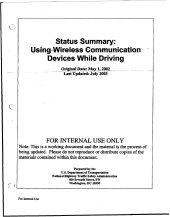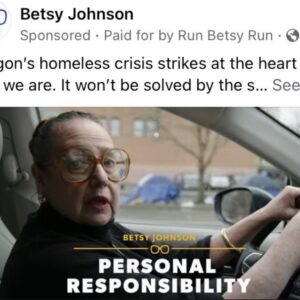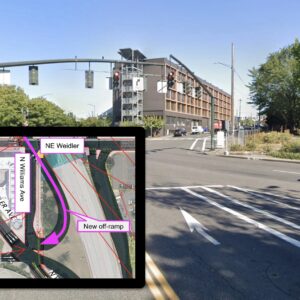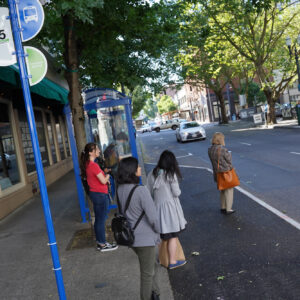
The New York Times reported yesterday that the National Highway Traffic Safety Agency (NHTSA) kept the public in the dark about research that warned about the risks of distracted driving.
The information is now coming to light thanks to Freedom of Information Act requests by two advocacy groups (the NY Times has published the entire body of research).
Interviewed by the NY Times, the former head of the NHTSA said:
“… he was urged to withhold the research to avoid antagonizing members of Congress who had warned the agency to stick to its mission of gathering safety data but not to lobby states.”
The director of the Center for Auto Safety (one of the two groups who pressed to have the research made public) told the NY Times that, “We’re looking at a problem that could be as bad as drunk driving, and the government has covered it up.”
Researchers concluded that in 2002, a total of 955 fatalities and 240,000 injuries were caused by people using cell phones while driving.
Researches also drafted — but never sent — a letter to the Transportation Secretary at the time. The letter issued a warning that hands-free laws might not solve the problem. From the letter:
“A significant body of research worldwide indicates that both hand-held and hands-free cell phones increase the risk of a crash. Indeed, research has demonstrated that there is little, if any, difference between the use of hand-held and hands-free phones in contributing to the risk of driving while distracted…
We recommend that drivers not use these devices when driving, except in an emergency.”
Cell phone use while driving and distracted driving in general is a perennial issue in this country. States and cities have tried to curtail the behavior through a mish-mash of legislation that usually falls short of really stopping it.
In Oregon, legislators passed a new law this past session that seeks to curtail the use of handheld cell phones while driving. However, the law, HB 2377, not only allows the use of hands-free devices, but it allows exceptions for a variety of circumstances including, “a person operating a motor vehicle in the scope of the person’s employment.”
What’s even more startling about this news is that Dr. Jeffrey Runge, the former head of the NHTSA, said he felt the issue was “dire and needed public attention.” Here’s more from the NY Times:
“I really wanted to send a letter to governors telling them not to give a pass to hands-free laws.”
According to the draft letter, researchers were concerned that passing hands-free laws would give people the wrong impression. From the letter:
“…such legislation might erroneously imply that hands-free phones are safe to use while driving.”
Officials from the NHTSA maintain that the conclusions are not definitive and that the findings were never meant for public consumption.
Either way, hopefully this news helps usher in an era of increased scrutiny on prevention of distracted driving. But I wouldn’t hold my breath. Drunk driving is largely vilified in the U.S. because drinking has a long legacy of being a sin in this country and advocacy groups like MADD have been highly successful. Eating a burger and/or chatting with your friend while you drive — while arguably just as dangerous — is far from garnering the same amount of public censure.
I wonder how these revelations would have impacted the vote on HB 2377 in Salem. I also wonder if we will see more stringent legislation in upcoming sessions.
I also wonder what other important traffic safety research and reports have been withheld from the American public because of politics.





This “withheld” study says nothing most people in transportation didn’t already know…the fact that that it was withheld speaks to the strong push-back anyone, governmental or not, would see if driving while talking on a cell where treated like if they were drunk driving.
but “my wife applies mascara while driving, how safe is that?”…
Hmmmm wonder what the reduction in health care costs would be if 100’s of thousands of ‘accidents’ were avoided every year.
I wonder what the increase of cycling would be if the roads were signficantly safer? I wonder impact that would have have on public health. I wonder what impact that would have on fuel consumption?
This report definitely needs to be buried. It’s Anti-America. You should have the freedom to do what ever you want while operating a vehicle. To hell with the greater good!
At some point you either throw your hands up and ban driving altogether or you just deal with this crap. I don’t really see the difference between conversing hands free and conversing with someone in the car. So maybe ban all talking altogether? What about singing to music in the car? That could get mistaken for hands free communication besides music itself is distracting so ban radios.
Yes, people should be aware of the dangers of driving while distracted and just how much it is responsible for accidents, but it won’t change behavior and legislating every single possible distraction will prove to be impossible.
To answer Jonathan’s rhetorical question (“I wonder how these revelations would have impacted the vote on HB 2377”), I don’t think it would have impacted the vote much at all. I don’t think opposition to the bill was based on factual, rational arguments. I think the pols who opposed the bill did so to pander to the emotions/ideology of their constituents. Emotions and ideology are generally not effected by reason or rational argument.
We live in a post-truth era…
And this is why I believe that if there is a future for private automobiles it will most likely include automated driving systems.
At some point in the very near future the skill of one of these systems will surpass that of the average cell phone using, makeup applying, mobile office running, radio tweaking, movie watching, real estate deal making, lane straddling, ADD afflicted, prescription drug abusing, child distracted driver. When that happens it will not be required by law; car insurance companies will price manual drivers out of the market.
While I look forward to safer streets I also foresee that after traffic automation reaches market saturation there will be a movement to restrict non-automated users.
Driving is such an interesting cultural situation. In Germany, home of the Autobahn, when you drive all you do is drive. You don’t fiddle with the radio, you don’t talk to your friends, you drive. In Italy it’s the exact opposite. The US falls somewhere in between.
I don’t know for sure but I suspect bike-friendly countries like Holland and Denmark are more German than Italian – or American – in their car culture.
“automated driving systems”? They’re called “public transit” and they exist today!
If you do not believe that drivers talking on a cell phone while operating a motor vehicle is a danger to others, please move on to the next message.
If you do believe there is risk involved, as I do, please consider the following:
Most cell-phone conversations involve at least two people. If you are calling someone and that person is driving and answers your call, ask them to return your call when they are not driving, and hang up. If you are driving and someone calls you on your cell phone, don’t answer it. Voice mail, call logs and caller ID will let you return their call when you are not driving.
If drivers are not willing to take responsibility for operating safely, you can at least not contribute to the problem.
Let your friends know that you prefer to not contribute to the next cell-phone related crash or death and suggest that they do the same.
I know someone who was talking to a driver during a crash. The driver was responsible, as was the other party on the call.
Let’s end it now.
I read something yesterday that said that talking on the phone to someone is different from talking to a passenger b/c passengers tend to alter their conversations with driving conditions (like if it’s dark and raining and the driver needs to be concentrating more) as well as providing an extra set of eyes on the road. It’s a generalization, so take it for what you will, but it was the first explanation that I had heard as to why talking to someone *in* the car is different.
peejay #8:
“They’re called “public transit” ..”
Yes, public transit is automated.
In its current incarnation in the US public transit is not convenient enough for users to keep up with the pace of business and life around them.
When you combine that with memorable situations like meth heads ranting around the MAX train threatening people if you don’t take the leaking battery he is holding or the urine fragranced bus its very easy to see why most Americans won’t be drug on to mass transit until the apocalypse.
It’s all about choice; when you are on mass transit you don’t have one. You are effectively trapped with people you would never choose to be around. Some of those people Choose not to stop behavior from their car on public transit. In a society in which punctuality is so critical you can’t simply get off at the next stop and expect to make your transit connection: you’re trapped by the choice to take public transit.
The public transit version of computer driven cars, PRT, could get people out of cars. Of course their is a lot more money tied up in allowing the current paradigm to continue.
While I generally accept the premise that cell phone use is detrimental while driving, there are times when driving takes very little concentration (rural highways mostly), where I believe the average person is in greater danger of falling asleep at the wheel than being distracted by their phone conversation. It’s just a hypothesis, but if it keeps a drowsy driver awake, then talking on the phone in rural settings still seems OK to me. Urban settings, not so much though.
Why wait for law, use shame. When I see an idiot driver with a cell phone in hand, I yell at them: “Hang-up and drive!”
This is not a warm fuzzy approach that will win friends. But if they hear it from enough people, they might get it. If only cyclists yell, it might give cyclists a bad image. Oh well, I’d rather be unpopular and alive than liked and dead. I also yell at them when walking. If I drove more, I’d yell at them while driving, but that might distract me.
Discovering a serious danger to others imposes a moral obligation to mitigate it.
The NHTSA head who hid these taxpayer paid reports from us was a tool for evil interests.
I am really upset. How can the government cover up such dangerous behavior? All these years I have spent texting while commuting back and forth to work, and NOW they tell me it’s dangerous!?
Corey said, “I don’t really see the difference between conversing hands free and conversing with someone in the car. So maybe ban all talking altogether?”
Someone else in the car can see what is going on around them and knows when to spontaneously keep quiet for a minute if the driver needs extra concentration. A passenger in the car is also a second set of eyes and can alert the driver to things the driver doesn’t see. A disembodied voice on the other end of a phone has no concept of when to lay off asking complicated questions and cannot see anything going on in the driver’s immediate vicinity. Hence, talking on the phone is more dangerous than talking to a passenger.
Sure, some folks are more adept at multi-tasking and can more skilfully pay attention to driving while talking on the phone. Some folks “hold their liquor” better than others, too.
And, “deal with this crap”? What exactly is “this crap”? People being injured or killed? Expensive property damage? It is very strange that more people are not appalled at the amount of injury and death we accept as a “normal” part of getting around. Because I want to go from here to there, I should accept that I have a larger-than-average chance of dying or incurring a chronic injury as a result? Driving a car is like walking around pointing a loaded gun at people; driving while drunk or talking on cell phones is like doing it with a nervous twitch that makes it way more likely you will pull the trigger “accidentally”. Oopsie-doopsie! Sorry you died!
If DWP (driving while phoning) is known to be as dangerous as DWI (regardless of whether this report would have been released, other studies have shown this), why is there no justification for creating penalties for it?
The contention that driving while on a cell phone poses dangers equivalent to driving while intoxicated is demonstrably false.
Consider the statistics for drunk driving fatalities nationwide:
In 2008 (an unusually low year!) there were 11,773 alcohol related driving fatalities (Source: NHTSA’s 2008 Traffic Safety Annual Assessment Highlights)
From this we should expect that talking on a cell phone while driving is less than 1/10th as dangerous as driving while intoxicated — because driving while talking on a cell phone is certainly more common than driving drunk.
As for HB2377, it is clear that it contains many exceptions that it should not contain. But the legislature was not willing to put their foot down, and finished with a bill that really does nothing but give police an excuse to harass teenage drivers. I don’t really know what the problem is – could it be the State Democratic Party, or the individual elected officials? Given their strong union backing, if Democrats manage to court a strong enough coalition of businesses, they can abandon all pretense of Social Justice. The direction that things are going is toward the “nanny state” in a very ugly incarnation.
Last week a cell-phone-driver stopped in the middle of an intersection in front of me and my son, forcing us to stop in traffic. She then rolled a few blocks before just sitting at a stop sign in front of us as she talked.
I always fear more when I cycle near cell-phone-drivers. I’d like to see them outlawed while driving and I agree that we should politely decline to speak with folks while they are driving unless they are on a boring stretch of freeway.
Once again we see the “states rights” issue being used a political ruse to further an agenda that favors corporations over the common good. Score one for the Business Party.